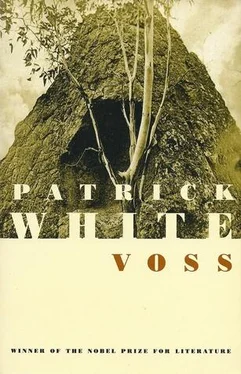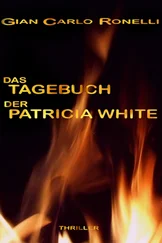The boy lingered in that darkening desert of broken windmills and old umbrellas. Beyond the rocks, with their cutting edges of glass, he found a handful of hair. He pulled the tuft as if it had been a plant — at least it was growing out of the sand — and as he shook it free, he shivered for the sensation of white man’s hair, that he was touching for the second time. This was fine, frizzy stuff, a smouldering red in the last light. This, the blackfellow realized, would be the hair of Mr Angus. He remembered the thighs of the young man gripping the withers of a horse, and his pink skin shining through a wet shirt.
In that desert place the light continued to deepen.
Whatever else there might have been, Jackie knew there was no time left to discover it. So he ran from the dead men. When overtaken by darkness, about a mile off, he had reached a patch of brigalow scrub, and there he lay down.
Moonlight was of doubtful benefit when it came, because all night the spirits of the dead were with him. The thin soul of Turner was hanging like a possum, by its tail, from a tree. There was a cracking of sticks and whips by Mr Angus, who would rise up very close in a huge, white, blunt pillar of furry light. The boy thought he would not be able to endure it, and was pouring sand upon his head. When daylight came, his eyes were turned up and the rims of his eyelids staring outward, in a kind of fit. But he soon recovered in the heat of the morning and continued eastward, talking to himself of what he had seen.
As he left the country of the dead behind him, he realized that he had not found the remains of Mr Judd. Journeying along, through the glare of the sun and the haze of memory, the form of the big white man was riding with him on and off, the veins in the back of his broad hand like the branches of a tree, his face a second copper sun. This link between the flesh and the sullen substance of nature was in itself an assertion of life, and the boy would hang his head in relief and shame.
Jackie promised himself great happiness in talking to old Dugald. As he approached Jildra, he began to sing. To his disappointment, however, he discovered that Dugald had become so old he was again young, and he, Jackie, was weighed down with the wisdom of age. So he did not tell Dugald much beyond some uninteresting facts concerning the mutiny of the white men. All else he kept to himself.
For it is not possible to communicate lucidly with men after the communion of souls, and the fur of the white souls had brushed the moist skin of the aboriginal boy as he shuddered in the brigalow scrub. He was slowly becoming possessed of the secrets of the country, even of the spirits of distant tribal grounds. The children of Jildra ran screaming from him and hid in the gunyahs, and when he went from there, whole tribes of strange natives would beat the trees as he approached, or sit in ashy silence round their fires as he recounted to their unwilling ears tales of the spirit life.
But of his own, the great spirit by which he was possessed, that would sometimes look in from the outside, through his eyes, but which more often would writhe inside him, like waning life, or gush and throb, like blood — of that spirit he would never tell, because nobody was to know of it but himself.
So Jackie came and went. He became a legend amongst the tribes. Of the great country through which he travelled constantly, he was the shifting and troubled mind. His voice would issue out of his lungs, and wrestle with the rocks, until it was thrown back at him. He was always speaking with the souls of those who had died in the land, and was ready to translate their wishes into dialect. If no other blackfellow learned what those wishes were, it was because his fear prevented him from inquiring of the prophet.
*
Although Colonel Hebden missed Jackie by a week or two at Jildra, he was not less determined to follow his original plan and search for Voss in the mountain ranges and along the dry river courses to westward. If clues led him, he had the will and the supplies to attempt whatever deserts the centre of the Continent might contain. In this spirit he led his party out from under the classic coolabahs of Jildra into a congenial autumn. The sun was pleasant on the Colonel’s eyelids as he turned in his saddle and looked back at the last of the roofs and smoke.
Accompanied by four friends, all experienced bushmen, together with two native stockriders and a whole train of baggage animals, the leader dared in the beginning to anticipate success, but, as the weeks were consumed and the distance covered, with the usual privation and disheartening natural resistance to all progress, whether of scrub and sand, or of uncommunicative wild blacks, the explorer’s ugly face grew glummer. Sometimes at sundown he could not bring himself to write in his journal the firmly rational account that it was his custom to write. In fact, he would sit and think about Amelia and the children, and, opening his whitened, salty mouth, yawn like a horse.
Even Colonel Hebden had been made to look ridiculous by that most irrational country; the resistance of his human dignity was being broken down. He did not, of course, intimate to any of his companions anything of what was happening; on the contrary, he was continually cheering them on with helpful and amusing suggestions, of which even the wisest were sometimes irritating. If the Colonel himself did not see, it was thanks to his long training in self-esteem.
Then, one evening, quite suddenly, he determined to make an early confession of failure, and hoped fervently to receive similar confessions from the others. Encamped beside a miserable waterhole, on the edge of a pocked plain, he had already crossed the track made by Voss and his party in their journey to the west — crossed it at least twice, if he had but known — and the cupful of brown scum round which the rescuers had squatted was a means of reprieve withheld from the mutineers on the last morning of their lives. The bodies of the latter, such as Jackie had found, only a little less of them perhaps, were in fact still lying within a good stone’s-throw of the beaten Colonel. This, however, was an irony he would never be allowed to enjoy.
Veils were spread upon him, and that night, when at last he fell asleep, he was haunted more than usually by the souls of the dead country with which he had become so unwisely obsessed. It could have been that the torments suffered by the lost on the morning of their dying still infested the surrounding air, but whatever the explanation, and it could not have been a rational one, the Colonel continued to turn, and the horsemen did not cease to ride.
*
In their perpetual ride, the three horsemen came on, through a fog of thin, yellow dust. Dust of presage entered their mouths, and was fumbled by their shreds of lips. The horses, too, tasted the yellow dust, but seemed to derive comfort from the slight muddy mucus on their bits.
In that pale but burning light, the shivery legs of the men were gripping the knives of horses’ withers, without, however, controlling them; only the tradition of control remained. A little to the fore rode Judd, of course, as befitted the usurping leader, but just as the men no longer controlled the horses, so the leader was no longer truly in command. His party continued to follow at his heels, because they feared to stop.
Judd was mumbling some of the time, and would look up from under floury eyebrows, like an old, deceived dog. Ah, if he could have thrown off that body which had always been a trial to him, whether hewing stone, receiving the cat, streaming through forests of tropical grass, bearing chains, crossing deserts, but to part company was not permitted till the very last. In the desert of earthly experience he must watch his hopes drying up, past and present, flesh and memory, his own clumsily reliable hand, the little suet dumplings his wife was heaping on his full plate, the innocent vein in a horse’s ear, the twin fountains of his wife’s love rearing high in trustfulness. Sleep was stirring on her dusty bed, and when he had bitten the nipple of her left breast, she cried out in anguish that the years had been deceiving her. He had to laugh, though. In the end, he laughed, all of us is bit. It was the kind of joke he could enjoy.
Читать дальше












